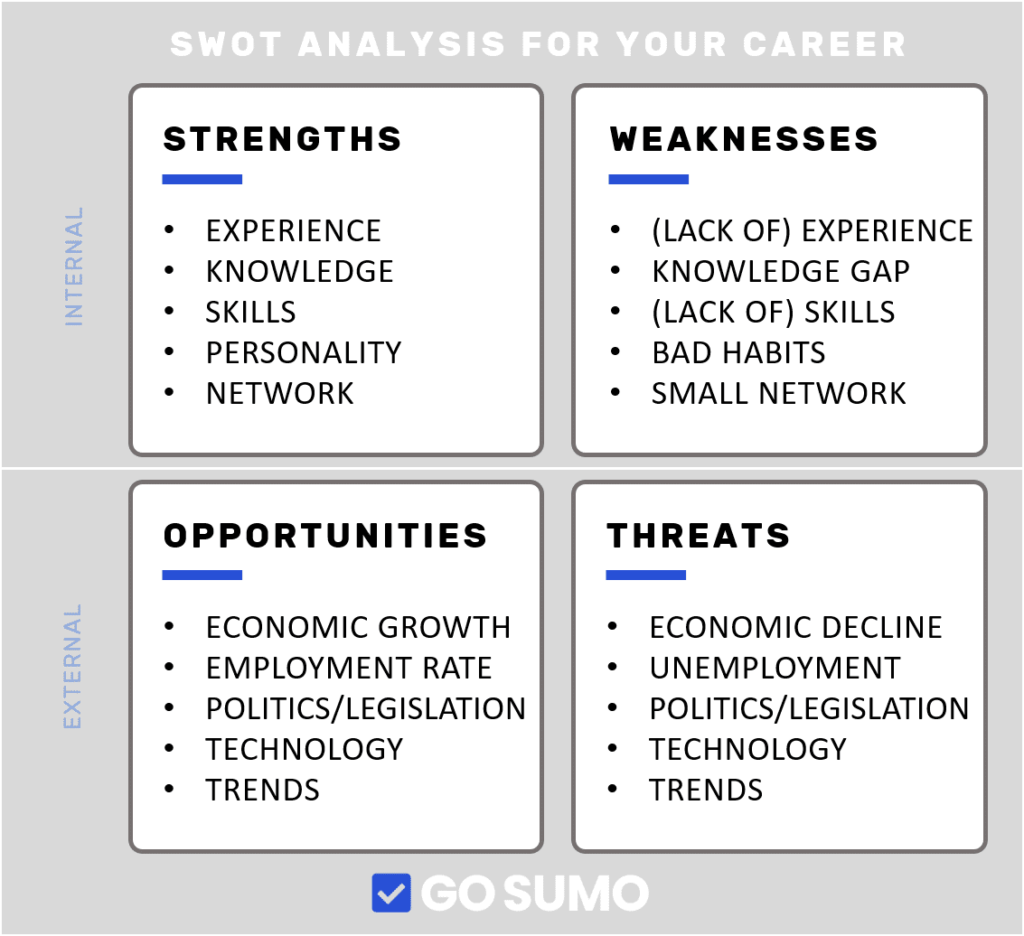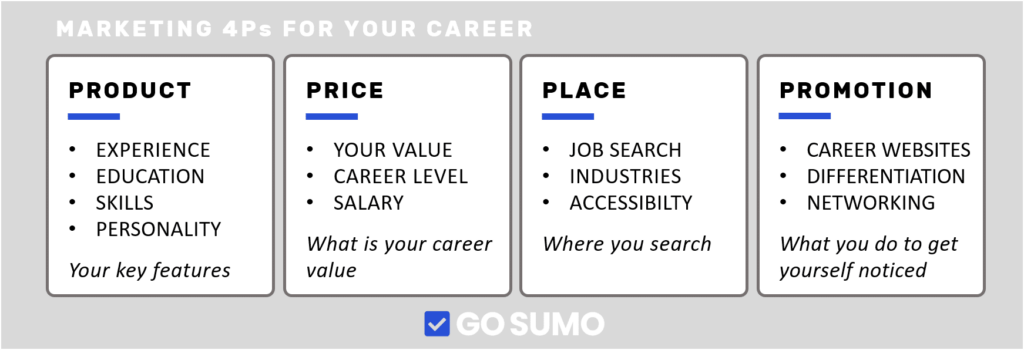Job hunting can feel like participating in a lottery, especially in a highly competitive industry with a lot of equal candidates. To improve your chances you have to differentiate yourself from other candidates. You have to optimize every aspect of your job application. To do this it can be helpful to do a hard reset of your job hunting strategy and to take a new approach to job hunting. Applying for a job is all about selling yourself. Just like a company that want to sell products, you cannot just start selling without a plan. Companies create a marketing plan to optimize their chances of making sales. You can do the same and use the marketing approach for your job hunting.
You might think you know nothing about marketing. How can this help me with my career? To understand marketing for your career you only need to know the basic principles of marketing. We will break the marketing process for your career down into little pieces and we will only go into the elements that are useful for your career. Taking the marketing approach will give you new insights about your career opportunities. Creating a new plan for you job applications will not only help you to write a good CV, cover letter or your job interviews. It will also help you to outline your career development.
What is marketing?
Most people only think about advertisements and commercials when they are asked about marketing. But marketing is much more than just advertising. Marketing is the whole process of getting potential customers interested and to persuade them to buy a products or service. Marketing is putting a product or a service on the market in such a way that it will be successfully sold to customers. The sale itself one of the final parts of the marketing process. There are several stages in the marketing process. The first stage of the marketing process starts with research and analysis. Research and analysis is crucial to give you the information you need to create a product or a service that people actually need and want and how to compete with competitors.
Research and analysis gives you information about your Strengths and Weaknesses (internal factors) and about Opportunities and Threats (external factors). Together they form the SWOT analysis. This is famous part of every marketing plan. For companies the SWOT analysis forms the base of their marketing strategy. The SWOT analysis is part of the process that is very useful to apply on your job hunt. It can give you great insights about your own strengths and weaknesses and forces you to analyze the job market to find opportunities and threats for your career.
After research and analysis and determining the strategy, the next step in the marketing process is to fill in the marketing tactics with the 4 P’s. The 4 P’s of marketing are: Product, Price, Place and Promotion. What should your Product be, at what Price, where will you sell it (Place) and how will you Promote it? This is called the marketing mix. The marketing mix are the tactics that form the operational marketing plan to increase the sales of your product or service.
Marketing for Job hunting
Let’s have a look at how we can use this brief overview of the marketing process for our job hunt. The key elements of this process are very applicable to the job application process. Research and analysis will prepare you to set your strategy and your strategy will spark tactics that will improve you job applications. In the next part we will explain how to apply every part of the marketing process for your job application.
Research and analysis
Marketing research and analysis is divided into two areas; internal analysis and external analysis. Internal analysis includes every aspect within the company and external analysis includes circumstances outside the company. When you do an internal analysis on yourself the outcome should be an overview of your strengths and your weaknesses. Your internal analysis is all about your experience, your knowledge (education), your achievements, your personality, your skills and even your network. The external analysis are all about the circumstances. What opportunities or threats are there for you to succeed? External factors can be the economy, politics, legislation, unemployment rates, trends, technology and innovations. The internal and the external analysis combined will result in a personal SWOT analysis.
Strengths and weaknesses
Knowing your strengths and weaknesses is always important when you are applying for a job. Two of the most common interview questions are: “What is your biggest strength” and “what is your biggest weakness”? Even though most people prepare these questions for a job interview. We select just one or two strengths and one “desirable” weakness (my biggest weakness is that I work too hard…) to answer this job interview question. By doing so most people don’t take the effort make a full overview and an honest analysis of their strengths and weaknesses. Analyzing your strengths and weaknesses give you a clear insight of what makes you a good candidate and what differentiates you from other candidates.
It can be hard to estimate if something is really a strength or a weakness if you don’t know the playing field. Reading a lot of job advertisements in your industry can help you to find what requirements are missing on your CV? It is also important to contact recruiters. You can contact recruiters before you apply for a job to get more information about the job requirements. Contacting recruiters after a rejection can also give you important insight about how you compare to other candidates.
There are a couple of areas where you can search for the strengths and weaknesses that are important for your career development. We have assembled a list of questions you can ask yourself to help you find your strengths and weaknesses in each area.
Experience
What job title would define your most important working experience?
What other relevant, but maybe less dominant in your career, working experience do you have?
Which important tasks or responsibilities have you mastered with your experience?
In which industry do you have the most experience?
Which other relevant industries have a connection with your career?
Does your experience match the job requirements that are asked for in job descriptions?
Knowledge / education
Is your education still relevant for your current career?
What aspects of your education is most relevant for your work today?
Does your education match the requirements in the job descriptions?
Did you have grades that stood out from other students?
Which after-school courses did you complete to keep your expertise up-to-date?
Personal skills / Personality / Personal life
What do you think are your best personal skills?
What personal skills, that you own, do you often see in job descriptions in your area of work?
Which of the personal skills that you possess are crucial for your area of work?
What are your best / worst personal traits? (To get an honest overview, ask friends and family to help with this)
Which personal skills that you lack are very important for your area of work?
Are there any aspects of your personal life that could hurt your chances of success? (Convictions, addictions, etc.)
Are there any other circumstances that might cause limitations? (Caregiving responsibilities, illness or disease, etc.)
Network
Analyze your network. Do you consider your network to be a strong advantage for your career?
In which way could your network help your career development?
Do you have a network in the line of work or industry that you job hunting in?
These are just some of the questions you could ask yourself to get an analysis of your internal environment. You could also ask friends or family to help you with this analysis. Most people take some of their strengths (or weaknesses) for granted and mistakenly assume they are not relevant.
Opportunities and threats
The next step is to analyze the external environment. The external environment will give insight about opportunities and threats for your career. Analyze all circumstances outside of yourself that you cannot influence. Search for circumstances and developments that could be crucial for your career or could influence your career directly or in the future. Finding market data and competitor date is easier for companies (they can pay companies to get that information), unfortunately this is not equally available for job hunters. But for the purpose of job hunting we don’t need that much detailed information. It is important to gather as much data as you can and even to gather estimates and expectations where possible. Insight in the opportunities and thread will help you to set your job hunting strategy in the next stage. We have divided the external environment in separate areas to help you identify the opportunities and threats that are relevant for your career.
Economics / unemployment
What is the economic trend in your area / country?
What is the unemployment rate trend in your area / country?
What is the economic trend in your industry?
How is the job market in your industry?
Politics / legislation / current affairs
Is the political situation in your area / country stable?
Is there any legislation that limits your career?
Is there any legislation that limits your industry?
Are there other external factors that cause a threat or an opportunity to your career (for example: a pandemic, global warming, etc.)
Technology / innovation
Are there any new technologies or innovations in your industry that pose a threat for your career?
Are there any new technologies or innovations in your industry that offer new opportunities for your career?
Are there any new websites or apps that offer new opportunities for your career?
Are there any websites or apps that form a threat? (For example Uber changing the traditional taxi business or social media apps)
Trends
Are there any trends in your industry or related to your industry that pose a threat for your career?
Are there any trends in your industry or related to your industry that offer new opportunities for your career?
These questions can give you some idea of the kind of questions you could ask yourself. The questions above are not very in depth to any particular industry. With the knowledge of your own industry you could probably come up with more relevant questions to ask yourself about your own career and industry. It is also not important to know or to find the answers to all these questions. They can help you to get a clear overview of your own strengths and weaknesses and the opportunities and threats you may face in your job marketing, industry or country itself. Try to find 5 key points for every part of the SWOT analysis; 5 key strengths, 5 key weaknesses, 5 key opportunities and 5 key threats. After you have boiled down the most relevant information you can fill in your SWOT analysis. You can use the SWOT analysis to define strategies with each combination:
Strengths & Opportunities = Strategy: Using your strength to take maximum advantage of opportunities
Strengths & Threats = Strategy: Using your strengths to avoid or deflect threats
Weaknesses & Opportunities = Strategy: Overcoming your weakness by taking advantage of new opportunities
Weaknesses & Threats = Strategy: Defensive, minimize weaknesses and avoid threats
Career Marketing 4P’s
Writing a strategy for your job hunting may sound a bit over the top, but it can be a real eye-opener. A SWOT analysis can uncover new angles that might lead your job hunt to success. With a SWOT analysis and new strategic insights you now can start making a plan to apply your new insights. In a marketing plan the 4 P’s are used to decide on the actions and tactics that must be taken. They can help you to decide on what to focus, what actions to avoid, where to look for job opportunities and at which career level you should apply for a job. The 4 P’s represent four elements of a product or service that are fine-tuned by the marketing plan. They stand for: Product, Price, Place (also referred to as the distribution aspect) and Promotion. How can we apply these 4 P’s to job hunting?
Product: You are the product that you are trying to sell when you are applying for a job. Experience, knowledge, personality, skills all form the features of you.
Price: What is the value that you have to offer, what is the job level that you are applying to?
Place: What tools are you using to find job openings? Which websites, recruiters or agencies do you use to sell yourself? But this can also be literally your location: What is your search area, which cities, what is the periphery of your search?
Promotion: How do you sell yourself, how do you advertise yourself. What do you do to differentiate yourself from other candidates?
Let’s dive deeper into each P to discover how you can use your SWOT analysis and strategy to fill in your P’s.
Product
If job hunting is all about selling yourself. You should start by looking at yourself from a different perspective, look at yourself as a product. This is not something most of us like to do. We consider ourselves to be unique and we don’t like to be treated as a number or in this case a product. However for this exercise to it is necessary to be able to be honest about yourself. You must be able to block emotions like pride or negative thoughts to get an honest overview of your professional features. What defines your career, your experience, your knowledge? Do you have the features meet (or exceed) the job requirements set by recruiters. What should you emphasis, or what is lacking and should be improved?
Price
What is your price? You can consider a salary your price. But to analyze your career you can also see “Price” as your value. What is your career level? Which jobs are below your career level and which are above your scope at the moment?
Place
“Place” in marketing often refers to distribution. This aspect of your marketing plan defines your market. This can literally mean in which area or city do I search for work. How long of a commute have you decided to be acceptable for you? Are you willing to relocate for a job? But the Place aspect should also give answer to the question in which industry are you looking for a job? Which other (related) industries are possible to involve in your search?
Promotion
The promotion part of marketing is probably the best known part. Most people think about advertisements, commercials or social media campaigns when they are asked about marketing. Promotion is the most visible parts of marketing, but in most cases promotion is one of the last steps in the marketing plan. When you are job hunting, promotion serves several purposes. First of all promotion should focus on getting noticed by recruiters and hiring managers. There are a lot of websites where you can register and leave your CV. Select the most useful ones for your job hunt. The second purpose of promotion is communicating the benefits and value you have to offer as an employee. What problem can you solve for the company?
A third aspect is differentiation, you can get yourself noticed by making sure that you stand out from other candidates. If all other candidates competing in your industry have a similar CV, same career level, same education etc., you have to differentiate to get noticed. How can you differentiate yourself from other candidates? You can differentiate yourself in many ways; of course you can stress your strengths in your CV or cover letter, you can find new ways of getting in touch with companies or recruiters, you can create a CV design that will stand out from other candidates.
Creating a marketing plan for your job hunt or career may seem like a lot of work. But if you, like many others, have been applying for jobs for some time without any results, you might want to consider going back to the drawing board. Creating a marketing plan can give you a new roadmap and new insights to improve your job search and your job applications. It can also give you fresh new energy to continue your job hunt. It can be very demotivation to have been rejected several times for a job application. Starting from scratch and restructuring your job hunting strategy can boost your motivation and the quality of your job applications.
At Go Sumo we strongly believe that using marketing principles for your job hunting will improve your chances of success. One of most important tools of your job application is your CV. A professional CV can help you to get noticed and to differentiate you from other candidates. With our professional CV templates you can create your own outstanding CV.






